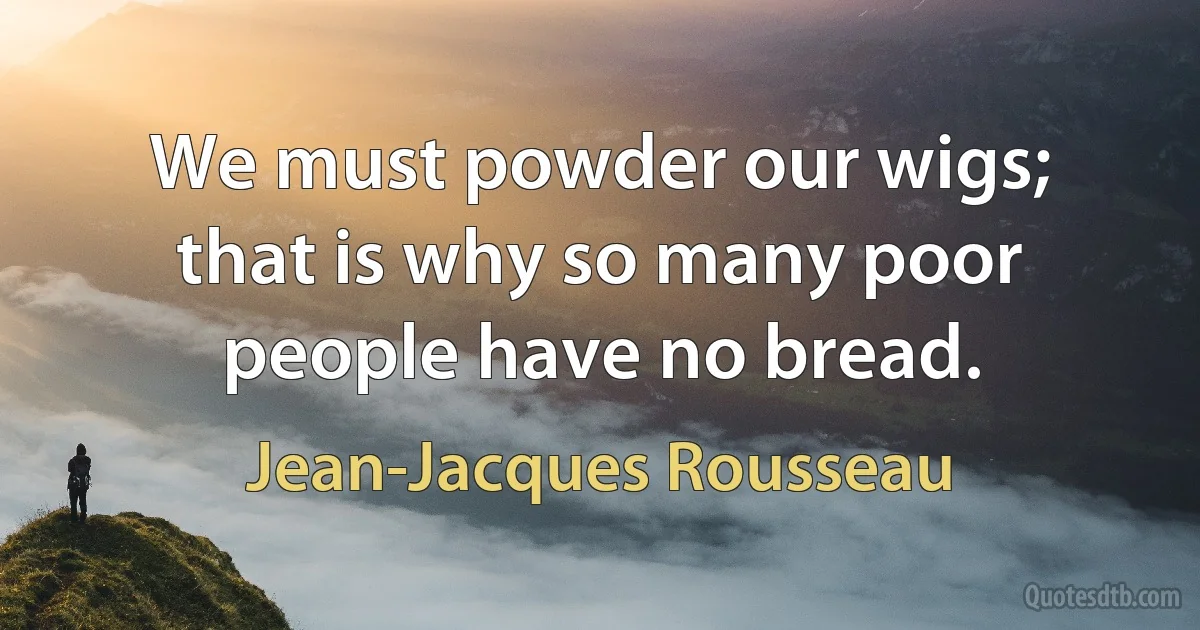Bread Quotes - page 15
In answer to the question posed by the title, I can't in all honesty say, "This movie." But that's only because there are far too many Freddy Got Fingereds and Say It Isn't Sos out there. The fact that What's the Worst That Could Happen? is better than these movies should in no way be misconstrued as even a backhanded compliment. It's like comparing stale, moldy, rancid bread with soggy, stale, moldy, rancid bread. Both are equally probable to turn one's stomach, and, if ingested, likely to require some time spent kneeling in front of a toilet bowl.

James Berardinelli
No one doubts-certainly not I-that the mind exercises a powerful influence over the body. From the beginning of time, the sorcerer, the interpreter of dreams, the fortune-teller, the charlatan, the quack, the wild medicine-man, the educated physician, the mesmerist, and the hypnotist have made use of the client's imagination to help them in their work. They have all recognized the potency and availability of that force. Physicians cure many patients with a bread pill; they know that where the disease is only a fancy, the patient's confidence in the doctor will make the bread pill effective.

Mark Twain
In this connection I call to mind Genesis, chapter xlvii...the pathetic story of the years of plenty and the years of famine in Egypt, and how Joseph, with that opportunity, made a corner in broken hearts, and the crusts of the poor, and human liberty--a corner whereby he took a nation's money all away, to the last penny...then took the nation itself, buying it for bread, man by man, woman by woman, child by child, till all were slaves...and it was a disaster so crushing that its effects have not wholly disappeared from Egypt to-day... Was Joseph establishing a character for his race which would survive long in Egypt? and in time would his name come to be familiarly used to express that character--like Shylock's? It is hardly to be doubted. Let us remember that this was centuries before the Crucifixion.

Mark Twain
For a month now I have been an out-and-out vegetarian. The moral effect of this way of life, with its voluntary castigation of the body, causing one's material needs to dwindle away, is enormous. You can judge for yourself how utterly I [am] convinced of it, when I tell you that I expect of it no less than the regeneration of humanity. All I can tell you is: let yourself be converted to a natural way of living, but one in which you eat suitable food (compost-grown, stone-ground, wholemeal bread) and soon you will see the fruits of your endeavours.

Gustav Mahler
There are a large number of religious establishments ["convents "] which they call khanqahs, and the nobles vie with one another in building them. Each of these is set apart for a separate school of darwishes, mostly Persians, who are men of good education and adepts in the mystical doctrines. Each has a superior and a doorkeeper and their affairs are admirably organized. They have many special customs one of which has to do with their food. The steward of the house comes in the morning to the darwishes, each of whom indicates what food he desires, and when they assemble for meals, each person is given his bread and soup in a separate dish, none sharing with another. They eat twice a day. They are each given winter clothes and summer clothes, and a monthly allowance of from twenty to thirty dirhams. Every Thursday night they receive sugar cakes, soap to wash their clothes, the price of a bath, and oil for their lamps. These men are celibate; the married men have separate convents.

Ibn Battuta
But when there's a vacuum in our democracy, when we don't vote, when we take our basic rights and freedoms for granted, when we turn away and stop paying attention and stop engaging and stop believing and look for the newest diversion, the electronic versions of bread and circuses, then other voices fill the void. A politics of fear and resentment and retrenchment takes hold. And demagogues promise simple fixes to complex problems. They promise to fight for the little guy even as they cater to the wealthiest and the most powerful. They promise to clean up corruption and then plunder away. They start undermining norms that ensure accountability, try to change the rules to entrench their power further. And they appeal to racial nationalism that's barely veiled, if veiled at all.

Barack Obama
Hindustan is a country which has few pleasures to recommend it.... Indians have no idea of the charms of friendly society, of frankly mixing together, or of familiar intercourse.... They have no horses, no good grapes, or musk melons, no good fruits, no ice or cold water, no good food or bread in their bazaars, no bath or colleges, no candles, no torches, not a candle stick.

Babur
After Bjartur had become a person of great worth, even he was prone to admit on occasion that life had sometimes been pretty hard in Summerhouses in the old days, but one has to take a few knocks if one wants to get on, surely, and anyway we never ate other folk's bread. Other folk's bread is the most virulent form of poison that a free and independent man can take; other folk's bread is the only thing that can rob him of independence and the one true freedom.

Halldór Laxness
Efficiency of a practically flawless kind may be reached naturally in the struggle for bread. But there is something beyond - a higher point, a subtle and unmistakable touch of love and pride beyond mere skill; almost an inspiration which gives to all work that finish which is almost art - which is art.

Joseph Conrad



